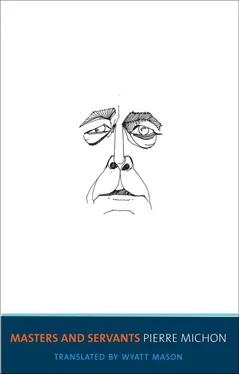He holds Pepa gently by the arm.
He moves down the stairs, he hesitates and puts his tricorne back on, then takes it off again, then decides finally, yes: he sets foot upon his parcel of worldly bliss. You know what bliss is, Señora? These periods in life, quite frequent during youth, though not so frequent that one may count on them, when you have faith in yourself without having to believe you’re someone other than yourself, when you hope that in a year, in ten years, you’ll have made it, which is to say you’ll have arrived, you’ll have what you wanted, once and for all you’ll be what you wanted to be, and you’ll remain that way; but right now you suffer, you’re a little less or a little more than yourself, but in ten years you’ll be there, there where you should be: bliss is such a small thing to suffer, and we all know that during these five or six years Goya was happy. He was patient, he chided himself for his mediocrity, he applied himself to making his name; and he was a little bit sneaky on this count, a touch of talent and a touch of imposture, a talent for color, for low bows to the princes, bowing and scraping, stuffy or spirited discussions about masters, technique, finishing touches, profits: this with Bayeu who thought he was Mengs; with Mengs who was already dying but who was sticking to the belief that he was the word made paint; with young colleagues no less talented or sneaky than he, who wanted to fatten themselves as well, have their own carriages, paint well, to be Mengs or Tiepolo one day, depending on whether their tastes and their palettes drew them toward angels as stiff as popes or to those more suave and ambiguously fleshed. And of this so-called imposture: if you succeed at making clear distinctions between things, is it imposture? Why wouldn’t painting be a farce, since life is one, if marrying poor Pepa and toadying to Bayeu gets you princely commissions, and the glances of duchesses? Come on, it was a pleasure destroying those stretchers long ago in Saragossa, a pleasure to die of laughter inside when Mengs was talking about the Golden Proportions. All of that was child’s play; it was a betrayal of the brotherhood of painters, of painting, perhaps, and of the very working of things: imagine an augur laughing in the face of a great captain, serious and nervous, leaning over some chicken guts over which other augurs are nodding, interpretively. The great captain loses his battle, the augurs are hunted down, everyone knows that his misfortune is meaningless, who gains from any of it? No: what is meaningful, what painting means, is to toil like a galley slave on the sea, with that furor, with that helplessness: and when the work is done, when the penal colony opens for an instant, when the painting is hung, then say to everyone, to the princes who’ll believe it, the people who’ll believe it, the painters who won’t believe it, that it came to you in one fell swoop, against your will and miraculously in harmony with it, a spring day blooming from your brushtips, that something took possession of your hand and carried it like angels draw chariots with a single finger, something like Tiepolo returned to Earth, all of la pittura flowing through you, all the beauty of mother nature in your grasp (can you hear, Señora, the great, silent guffaws in the heads of painters everywhere?) — that art just came to you, winged like an angel, easy as a maja . Why not imagine a galley slave on the bridge of his galley, a ball and chain on each foot, hands dead, swearing that the sea itself had kindly moved his oar for him, had purged him of his pain, had cradled it — and why not, since it is the source of his pain?
He played this game for five or six years, and this time blissfully, because now (or have I already told you?), he knew how to paint, and he didn’t ignore that he now knew how to paint. Not that he believed in his painting, as they say; not that he then believed in Painting, in its inaccessibility, the absence and much wished for arrival of which had tortured him, long ago, this dolorous hope that had perhaps seized this child amongst gilded saints that watched over him, asked him things, this dream, more fleeting than a shadow and never seen, born of the prodigious conjunction of a hand and a little space that becomes the world; and the world would be born out of that hand. Yes, Señora, what he had wanted long ago was for the galley slave to sign the sea with his oar, and since it couldn’t be that way, why not just return to his bench beside those like him and labor, perhaps happily, wait for his grub, and row. Painting was nothing more than that; and he knew how to paint, if there wasn’t more to it than that. Certainly he was happy, on his bench, on the Calle del Reloj , Pepa fixing his grub, princes wanting a quail hunt, a picnic, a swing scene, and without much effort he painted guns and quail, grapes, a pig under some trees, with fine blues and pinks, restrained reds that nonetheless reach out to the viewer, all Giaquinto. Such tranquillity. He thought at last that he was well out of it. From class to class he peacefully rose toward death, the death of an excellent painter. And an evening awaited him where amongst Italian arbors he would sit contentedly drinking, old, a master, in the leafy shadows with one hundred ceilings behind him, don Francisco Goya.
FOR THE MOMENT, THOUGH, he still is young and disciple of everyone, is sitting beneath a Spanish arbor, near Manzanares, in May; at the Auberge du Coq; in 1778; with Ramón Bayeu and José del Castillo, painters; with Josefa? Please, Señora. With a bullfighter, Señora? Why not: so they brought along Pedro Romero or his brother José, or both, because in the company of these butchers, one is bound to attract majas like wasps to honey. So one of these majas they picked up told us of this gathering of men of few scruples at play with their shirts agape, of their babble that overflowed with talk of coin of the realm, and this abundance of foliage bent over these men of gain, charitable wines in greedy throats, greedy, but friendly, fleeing the pain; one of them — and perhaps it’s this one actually, Narcissa is her name, I think — her thigh is being groped under the lace, under the table, in the shadows, by the little Aragonese: because, Señora, you know he loved us very much, as they say, however infrequently— pretty or not — we came under his hand; he painted us, without ceremony he touched us, under a table or on top, with words, touching us one way or another, and without ceremony consuming us — because by that time he had given himself the right to pleasure, and it was no longer washerwomen — these you could show off — and when you paint ceilings for princes and you want to enjoy yourself you have the right to, like a prince. And since all that, for the little fatso, was no more trouble than the right words said at the right moment and the numerous skirts hiked at the right moment, I won’t say too much about it, if you don’t mind. There was no harm in it, his sin didn’t lie there. Therefore, she, la maja , said that our three painters feasted extravagantly with their matador, their foil, this living proof, who was a little tiresome, a little simple, but so profitable, proof on display that they weren’t just priggish pedants, that they preferred life to painting, blood to pigment: and if they got together to enjoy flowers and wine, May and young girls, it wasn’t to celebrate a living painter or to morn one dead; it was, my sweet, because they had landed — because Bayeu-le-Grand had landed for them — a fabulous commission, a fat commission for the lean newcomers.
King and Court were in Aranjuez, as they were every spring, with the flowing waters and the fields of jonquils; and from amongst the jonquils the king somehow got it into his head that he missed his great collection of Spanish paintings, left at the Pardo, and in the Pardo itself, on the walls of this immense gallery in which he was accustomed to dressing himself right out of bed, as kings do, a hundred steps and as many dignitaries between shoe and morning coat, another hundred steps between morning coat and sash, fifty hidalgos between sash and glove, and upon leaving the bedroom still rubbing his eyes he’d see the tricorne on the far wall, so small against the blue velvet, like a shepherd’s coat spied by the Asturias at the end of a pass, this last little piece of black that he would don only at the end of one Velazquez’s perilous, mute parades or of Riberas black ones, dignitaries with panaches, real or painted, ancestors dead and alive; the live ones followed him everywhere, to Aranjuez in May, to Granja in August, to Escurial in Autumn; but the dead ones who remained in the Pardo, unruffled on their steep walls, these he missed; perhaps he needed this mountain of dead men to welcome him to the breaking day, men who, once kings in flesh, now live only in their dreams: and through the chain of five or six living dignitaries he made it known to Bayeu-le-Grand that he wanted to see appear on his little levee, at Granja, at Aranjuez, all the dead dignitaries and forbears, that he wanted a little reflection of this great mountain he had in his mind, wherever he dressed; and Bayeu-le-Grand had charged Bayeu-le-Petit, del Castillo, and Goya, who weren’t dignitaries but who were quick with their hands, to reproduce over again these reproductions of dead men, in engravings, and at a good wage.
Читать дальше












